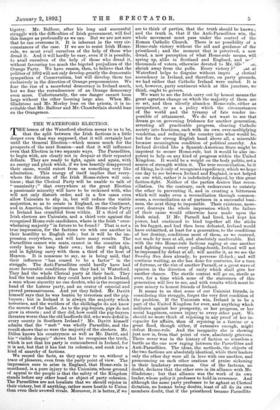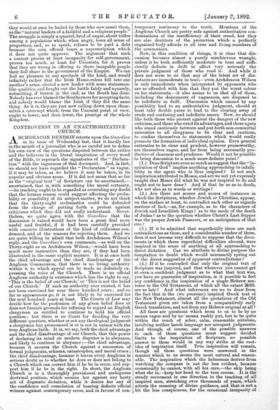THE WATERFORD ELECTION. T HE lesson of the Waterford election seems
to us to be, that the split between the Irish factions is a little deeper even than was supposed, that it will certainly last until the General Election—which means much for the prospects of the next Session—and that it will influence even that Election in two separate ways. The Parnellites, to begin with, are clearly not in despair at their repeated defeats. They are ready to fight, again and again, with an energy and pluck which, if we less heartily disapproved their cause, would extort from us something very like admiration. This energy of itself implies that every- where the division of the Irish Home-rulers will con- tinue ; that the Clerical Party will be unable to talk of " unanimity ;" that everywhere at the great Election a passionate minority will have to be reckoned with, who will not only disturb order, and in a few cases even allow Unionists to slip in, but will reduce the visible majorities, so as to create in England, on the Continent, and in America, the impression that the Home-rule Party in Ireland has crumbled from within. If a third of all Irish electors are Unionists, and a third vote against the recognised Home-rule candidates, where is the Irish " over- whelming majority " in future to be found ? That is not a true impression, for the factions vie with one another in their hostility to English rule ; but it will be the im- pression everywhere, and will have many results. The Parnellites cannot win seats, cannot in the counties sin- cerely hope to keep their own ; but they will fight, and in fighting carry with them a third of the host of Heaven. It is nonsense to say, as is being said, that their influence " has ceased to be a factor" in the struggle. The Anti-Parnellites could hardly have had more favourable conditions than they had in Waterford. They had the whole Clerical party at their back. They had the best candidate they could have picked in Ireland, a man whose sincerity no one doubts, who is the recognised head of the Labour party, and an orator of especial and proved persuasiveness. And yet they failed. Mr. Davitt himself says that he was beaten by terrorism and the pig- buyers ; but in Ireland it is always the majority which terrorises, and the wielders of the shillelaghs do not know the secrets of the ballot. As to the pig-buyers, pigs do not grow in streets; if they did, how could the pig-buyers threaten worse tan the old landlords did, who were defied in every county in Southern Ireland ? Mr. Davitt himself admits that the " mob " was wholly Parnellite, and the result shows that so were the majority of the electors. Mr. Dillon knows his countrymen as well as Mr. Davitt, and his "visible despair" shows that he recognises the truth, which is not that his party is outnumbered in Ireland, for it is not, but that it has lost its cohesion, and sunk into a kind of anarchy of factions. We record the facts, as they appear to us, without a trace of pleasure, even from the party point of view. The impression sure to arise in England, that Home-rule is, moribund, is a pure injury to the Unionists, whose ground of appeal to the people is that the safety of the Kingdom stands.before any other bond or object of party cohesion. The Parnellites are not loyalists that we should rejoice in their victory, but if anything, rather more hostile to Union than even their avowed rivals. Moreover, it is better, if we are to think of parties, that the truth should be known ; and the truth is, that if the Anti-Parnellites win, the whole movement must pass under the control of the- Roman Catholic Church. There is no possibility of a Home-rule victory without the aid and guidance of the priesthood ; and the moment that is perceived, a new dread, a new perception of what Home-rule means, will spring up, alike in Scotland and England, and thousands of voters, otherwise devoted to Mr. G1P-7 shrink away from the polls. Every victory)? ..at at Waterford helps to disguise without impro .g clerical ascendency in Ireland, and therefore, on party grounds, we had rather that Catholic Ireland were united. It is not, however, party sentiment which at this juncture, we think, ought to govern.
We want to see the Irish carry out by honest means the great agrarian change on which the majority of them are so set, and then silently abandon Home-rule, either as inexpedient, or as a policy which the circumstances of the world and the tyranny of fate render im- possible of attainment. We do not want to see that dream go on governing Irishmen for another generation, arresting all practicable progress, cleaving Catholic society into fractions, each with its own ever-multiplying vendettas, and reducing the country into what would be, but for the strong English hand above all, a miserable because meaningless condition of political anarchy. An Ireland divided like a Spanish-American State might be impotent to secure Home-rule, but it would be also im- potent to help on any kind of progress within the United Kingdom. It would be a weight on the body politic, not a source of strength within it. The true reconciliation, be it of liking, be it only of recognised expediency, which we hope-- one day to see between Ireland and England, is not helped on one whit, rather it is indefinitely delayed, by this great faction-fight. Neither of the parties desires that recon- ciliation. On the contrary, each endeavours to outstrip the other in preventing it, and in creating a bitterness which will make even a reconciliation through common- . sense, a reconciliation as of partners in a successful busi-- ness, the next thing to impossible. Their existence, more--- over, destroys the whole impression which the failure of their cause would otherwise have made upon the Irish mind. If Mr. Parnell had lived, had kept his power, had continued to bind together all the sticks in his faggot, and had then been defeated, Ireland would- have submitted, at least for a generation, to the conditions of her destiny, conditions most of them, as we contend, not made by man at all, and absolutely unalterable. But with the two Home-rule factions raging at one another and fighting round every polling-booth, Ireland will not be impressed by defeat at all; will ascribe it, as we see the Sunday Sun does already, to perverse ill-luck ; and will continue waiting, as she has done for centuries, for a turn of fortune, or the rise of another Parnell, or a great wave of opinion in the direction of unity which shall give her another chance. The sterile contest will go on, sterile as ever, for a time which none of the statesmen of this generation will live to see, and with results which must be- pure misery to honest friends of Ireland.
It seems to us that some of our Unionist friends, in considering this struggle, forget the very first condition of the problem. If the Unionists win, Ireland is to be a part of the United Kingdom for ever, and anything which militates against her prosperity, or her progress, or her social happiness, causes injury to every other part. We should no more think of rejoicing in any proof of her in- capacity for affairs, than of rejoicing in a. famine or a great flood, though either, if extensive enough, might defeat Home-rule. And the incapacity she is showing just now is, from that point of view, absolutely grievous. There never was in the history of faction so senseless a battle as the one now raging between the Parnellites and Anti-Parnellites. The ideas, the methods, the objects of the two factions are absolutely identical, while their leaders only the other day were all in love with one another, and pronouncing on each other orations of praise sickening in their laudatory sweetness. One of the factions, no doubt, declares that the other errs in its alliance with Mr. Gladstone ; but that alliance was the work of its own leader, whose policy it professes to hold. in reverence. And although the same party professes to be aghast at Clerical dictation, no human being doubts, least of all do its own members doubt, that if the priesthood became Parnellite they would at once be hailed by those who now assail them, as the "natural leaders of a faithful and a religious people." The struggle is simply a quarrel, bred of anger, about trifles among a population which, when angry, loses all sense of proportion, and, so to speak, refuses to be paid a debt because the coin offered bears a superscription which it does not quite approve. The argument that such a contest proves at least incapacity for self-government, proves too much, at least for Unionists, for it proves that they are wrong in offering to these incapable people their full share in the government of the Empire. We can feel no pleasure in any spectacle of the kind, and would infinitely rather that the Irish Home-rulers fell into one another's arms, elected a new leader with some statesman- like qualities, and fought out the battle fairly and squarely, submitting, if beaten in the end, as the South has done. Nobody has ever blamed the Southerners for accepting facts, and nobody would blame the Irish if they did the same thing. As it is, they are just now calling down upon them- selves a contempt which, from the Unionist point of view, ought to lower, and does lower, the prestige of the whole Kingdom.















































 Previous page
Previous page